TheGita Gujarati – Chapter – 4
Chapter – 4 – Shloka – 1
Lord Krishna continued:
I taught this immortal, everlasting “Yoga faction” (Karmayoga) to the Sun God Vivaswan.
Vivaswan taught this knowledge to his son Manu and Manu taught this knowledge to his son Ikswaku.
श्रीभगवान् बोले —- मैंने इस अविनाशी योग को सूर्य से कहा था, सूर्य ने अपने पुत्र वैवस्वत मनु से कहा और मनु ने अपने पुत्र राजा इक्ष्वांकु से कहा ।। १ ।।
Chapter – 4 – Shloka – 2
By handing down this knowledge of Yoga from generation to generation this knowledge slowly deteriorated, and finally disappeared.
हे परंतप अर्जुन ! इस प्रकार परम्परा से प्राप्त इस योग को राजर्षियों ने जाना, किंतु उसके बाद वह योग बहुत काल से इस पृथ्वी लोक में लुप्त प्राय हो गया ।। २ ।।
O Arjuna, I reveal this ancient and most important secret of Yoga unto you because you are My dear devotee and friend.
तू मेरा भक्त्त और प्रिय सखा है, इसलिये वही यह पुरातन योग आज मैंने तुझको कहा है ; क्योंकि यह बड़ा ही उत्तम रहस्य है अर्थात् गुप्त रखने योग्य विषय है ।। ३ ।।
Arjuna asked Lord Krishna:
Dear Lord, your birth on earth is very recent. The Sun however, took birth an extremely long time ago. I find it difficult then to understand how you could have told this ancient secret to Vivaswan the Sun God.
अर्जुन बोले —- आपका जन्म तो अर्वाचीन —-अभी हाल का है और सूर्य का जन्म बहुत पुराना है अर्थात् कल्प के आदि में हो चुका था ; तब मैं इस बात को कैसे समझूं कि आप ही ने कल्प के आदि में सूर्य से यह योग कहा था ।। ४ ।।
The Lord looked upon Arjuna and replied:
Arjuna, the answer to your question is simple. You are forgetting, O Son of Kunti, the both you and I have taken many births in this world together. However, only I, Lord, can remember this; you cannot.
श्रीभगवान् बोले —- हे परंतप अर्जुन ! मेरे और तेरे बहुत से जन्म हो चुके हैं । उन सब को तू नहीं जानता, किंतु मैं जानता हूँ ।। ५ ।।
O Arjuna, although birth and death do not exist for Me, since I am the immortal Lord, I appear on earth, by my Divine powers and ability, keeping My nature (Maya) under control.
मैं अजन्मा और अविनाशी स्वरूप होते हुए भी तथा समस्त प्राणियों का ईश्वर होते हुए भी अपनी प्रकृति को अधीन करके अपनी योग माया से प्रकट होता हूँ ।। ६ ।।
The Lord declared solemnly unto Arjuna:
O Arjuna, whenever good is overcome by evil, or whenever evil manifests itself throughout the world in such a way that good no longer exists. I will always appear on earth.
हे भारत ! जब-जब धर्म की हानि और अधर्म की वृद्बि होती है, तब-तब मैं अपने रूप को रचता हूँ अर्थात् साकार रूप से लोगों के सम्मुख प्रकट होता हूँ ।। ७ ।।
O Arjuna, I appear on earth from time to time for three main purposes. The first is for the protection and preservation of all that represents good, and of all those pure and saintly people on earth. The second purpose for which I appear on earth is for the destruction and removed and wrong-doers.
The third purpose is, of course, for the establishment and creation (or recreation) of Dharma (Righteousness or reinstating moral values among people on earth.)
साधु पुरुषों का उद्बार करने के लिये, पाप कर्म करने वालों का विनाश करने के लिये और धर्म की अच्छी तरह से स्थापना करने के लिये मैं युग-युग में प्रकट हुआ करता हूँ ।। ८ ।।
O Arjuna, I was born divinely, all my action (Karma) are divine. The one who knows and understands this fully in reality, is not born again after leaving the body. He comes to me in Heaven for eternity.
हे अर्जुन ! मेरे जन्म और कर्म दिव्य अर्थात् निर्मल और अलौकिक हैं —- इस प्रकार जो मनुष्य तत्त्व से जान लेता है, वह शरीर को त्याग कर फिर जन्म को प्राप्त नहीं होता, किंतु मुझे ही प्राप्त होता है ।। ९ ।।
O Arjuna, if one really to seek refuge and be one with Me, he must totally free himself from passion, fear and anger, seek my protection only, and purify himself with the fire of Gyan (knowledge). If one manages to accomplish these thing, he will be able to become one with Me in mind and body.
पहले भी, जिनके राग, भय और क्रोध सर्वथा नष्ट हो गये थे और जो मुझ में अनन्य प्रेम पूर्वक स्थिर रहते थे, ऐसे मेरे आश्रित रहने वाले बहुत से भक्त्त उपर्युक्त्त ज्ञान रूप ताप से पवित्र होकर मेरे स्वरूप को प्राप्त हो चुके हैं ।। १० ।।
O Arjuna, those people who love, trust and worship Me receive the same love, trust and worship from Me. All wise men follow Me in all respects. They follow my every path.
हे अर्जुन ! जो भक्त्त मुझे जिस प्रकार भजते हैं, मैं भी उन को उसी प्रकार भजता हूँ ; क्योंकि सभी मनुष्य सब प्रकार से मेरे ही मार्ग का अनुसरण करते हैं ।। ११ ।।
O Arjuna, those who do actions or Karma for the fulfillment of their desires and goals and those who worship deities (gods and god desses) for their prosperity, they will undobtedly achieve success quickly.
इस मनुष्य लोक में कर्मों के फल को चाहने वाले लोग देवताओं का पूजन किया करते हैं ; क्योंकि उनको कर्मों से उत्पन्न होने वाली सिद्भि शीघ्र मिल जाती है ।। १२ ।।
I, the Lord, O Arjuna, am the creator of the four castes (namely, Brahmin, Ksatriya, Vaishya and Sudra). You must understand Arjuna, that I who created these four orders of society, am a non-doer.
ब्राह्मण, क्षत्रिय, वैश्य और शूद्र —- इन चार वर्णों का समूह, गुण और कर्मों के विभाग पूर्वक मेरे द्वारा रचा गया है, इस प्रकार उस सृष्टि-रचनादि कर्म का कर्ता होने पर भी मुझ अविनाशी परमेश्वर को तू वास्तव में अकर्ता ही जान ।। १३ ।।
The Lord continued:
O Arjuna, since I, the immortal Lord, have no cravings for the fruits of action, I do not desire the reward of Karma. Therefore those who know me well are not affected or bound by Karma (action).
कर्मों के फल में मेरी स्पृहा नहीं है, इसलिये मुझे कर्म लिप्त नहीं करते —- इस प्रकार जो मुझे तत्त्व से जान लेता है, वह भी कर्मों से नहीं बंधता ।। १४ ।।
The Lord continued:
O Arjuna, ancient wise men who were searching for salvation in me, knew the facts well. However they even performed actions. Therefore O Arjuna, continue performing your actions doing your Karma as your ancestors once did in the past.
पूर्व काल में मुमुक्षुओं ने भी इस प्रकार जानकर ही कर्म किये हैं । इसलिये तू भी पूर्वजों द्वारा सदा से किये जाने वाले कर्मों को ही कर ।। १५ ।।
Even the wise men are confused about Karma (action) and Akarma (inaction). I shall now explain to you the truth about Karma. Knowing the truth, O Arjuna, you will be released from the bondage of Karma.
कर्म क्या है ? और अकर्म क्या है ? — इस प्रकार इसका निर्णय करने में बुद्भिमान् पुरुष भी मोहित हो जाते हैं । इसलिये वह कर्म तत्त्व मैं तुझे भली भाँति समझा कर कहूँगा, जिसे जान कर तू अशुभ से अर्थात् कर्म बन्धन से मुक्त्त हो जायगा ।। १६ ।।
One should know the principle of Karma (action) Akarma (inaction) and forbidden Karma, (forbidden action). The philosophy behind Karma is very deep and mysterious. So listen closely.
कर्म का स्वरूप भी जानना चाहिये और अकर्म का स्वरूप भी जानना चाहिये तथा विकर्म का स्वरूप भी जानना चाहिए ; क्योंकि कर्म की गति गहन है ।। १७ ।।
One who sees action (Karma) in inaction (Akarma), and inaction in action, is a wise man and a great sage. That man who has accomplished all actions is a Yogi.
जो मनुष्य कर्म में अकर्म देखता है और जो अकर्म में कर्म देखता है, वह मनुष्यों में बुद्भिमान है और वह योगी समस्त कर्मों को करने वाला है ।। १८ ।।
One who does all Karma without desire or attachment for the fruits of his Karma and one whose actions are burnt up in the of Gyan or wisdom, is regarded by even the wise men as a sage.
जिसके सम्पूर्ण शास्त्र सम्मत कर्म बिना कामना और संकल्प के होते हैं तथा जिसके समस्त कर्म ज्ञान रूप अग्नि के द्वारा भस्म हो गये हैं, उस महापुरुष को ज्ञानी जन भी पण्डित कहते हैं ।। १९ ।।
The Lord proclaimed:
He who is totally unattached to the rewards of action, is forever happy and satisfied, who depends on nobody in this world, and is constantly involved in action, is really performing no action at all.
जो पुरुष समस्त कर्मों में और उनके फल में आसक्त्ति का सर्वथा त्याग करके संसार के आश्रय से रहित हो गया है और परमात्मा में नित्य तृप्त है, वह कर्मों में भली भाँति बर्तता हुआ भी वास्तव में कुछ भी नहीं करता ।। २० ।।
That person, O Arjuna, who has conquered his body and mind, who has given up all enjoyments and pleasures of the world, and who performs action only for the sake of maintaining his body, does not encounter or subiect himself to sin.
जिसका अन्त:करण और इन्द्रियों के सहित शरीर जीता हुआ है और जिसने समस्त भोगों की सामग्री का परित्याग कर दिया है, ऐसा आशा रहित पुरुष केवल शरीर सम्बन्धी कर्म करता हुआ भी पापों को नहीं प्राप्त होता ।। २१ ।।
A person who is content with what he has who has no feeling of desire for other things, or uncertainty of any type, who has shed his envious feelings and who is above all even-minded in success and failure, such a person is no longer bound by Karma even if he still performs Karma.
जो बिना इच्छा के अपने आप प्राप्त हुए पदार्थ में सदा संतुष्ट रहता है, जिसमें ईष्र्या का सर्वथा अभाव हो गया है जो हर्ष-शोक आदि द्बन्द्बों से सर्वथा अतीत हो गया है —- ऐसा सिद्भि और असिद्भि में सम रहने वाला कर्मयोगी कर्म करता हुआ भी उनसे नहीं बंधता ।। २२ ।।
Lord Krishna continued:
A person who has no attachment to anything whatsoever in this world, whose heart is set on acquiring Gyan (wisdom), who works for the sake of sacrifice, and is a totally liberated person from the world, all actions for this person melt away and are meaningless.
जिसकी आसक्त्ति सर्वथा नष्ट हो गयी है, जो देहाभिमान और ममता से रहित हो गया है, जिसका चित्त निरन्तर परमात्मा के ज्ञान में स्थित रहता है — ऐसा केवल यज्ञ सम्पादन के लिये कर्म करने वाले मनुष्य के सम्पूर्ण कर्म भली भाँति विलीन हो जाते हैं ।। २३ ।।
The offerings in a sacrifice are Brahma (God), the sacrificial fire is Brahma (God), the one who performs the sacrifice is Brahma, the sacrifice itself is Brahma, the person performing the action of sacrifice is placed in Brahma and will reach Brahma, the ultimate goal of sacrifice.
जिस यज्ञ में अर्पण अर्थात् स्त्रुवा आदि भी ब्रह्म है और हवन किये जाने योग्य द्रव्य भी ब्रह्म है तथा ब्रह्मरूप कर्ता के द्वारा ब्रह्मरूप अग्नि में आहुति देना रूप क्रिया भी ब्रह्म है —- उस ब्रह्म कर्म में स्थित रहने वाले योगी द्वारा प्राप्त किये जाने योग्य फल भी ब्रह्म ही है ।। २४ ।।
The Lord continued:
Some Yogis prefer to perform sacrifice through the worship of deities (gods and god esses): other Yogis perform sacrifice to Brahma in the form of fire.
दूसरे योगी जन देवताओं के पूजन रूप यज्ञ का ही भली भांति अनुष्ठान किया करते हैं और अन्य योगी जन पर ब्रह्म परमात्मा रूप अग्नि में अभेद दर्शन रूप यज्ञ के द्वारा ही आत्म-रूप यज्ञ का हवन किया करते हैं* ।। २५ ।।
Some offer, in the fire of self-control, one of their senses such as their hearing. (This signifies that the signifies has no attachment to any of his senses.) Others offer sensual objects (objects of perception), such as sound, in the fire of controlled senses.
Signifying that the sacrificer has the will-power and restraint not to let his senses be influenced by evil, sin, or sensual objects of destruction.
अन्य योगी जन श्रोत्र आदि समस्त इन्द्रियों को संयम रूप अग्नियों में हवन किया करते हैं और दूसरे योगी लोग शब्दादि समस्त विषयों का इन्द्रिय रूप अग्नियों में हवन किया करते हैं ।। २६ ।।
Some Yogis sacrifice all the functions of their senses ans all their vital functions of life, into the fire of Yoga, in the shape of self control, which is kindled by Gyan (wisdom). (This signifies the sacrificer’s one-mindedness with the Lord, the Supreme Goal).
दूसरे योगी जन इन्द्रियों की सम्पूर्ण क्रियाओं को और प्राणों की समस्त क्रियाओं को ज्ञान से प्रकाशित आत्म संयम योग रूप अग्नि में हवन किया करते हैं ।। २७ ।।
Sacrifices come in many forms. Giving away material wealth for charity is a sacrifice. Austerity is a sacrifice. Yoga is a sacrifice. Making vows and promises involve sacrifice. Even self-study is a sacrifice.
कई पुरुष द्रव्य सम्बन्धी यज्ञ करने वाले हैं, कितने ही तपस्या रूप यज्ञ करने वाले हैं, तथा दूसरे कितने ही योगरूप यज्ञ करने वाले हैं, कितने ही अहिंसादि तीक्ष्ण व्रतों से युक्त्त यत्नशील पुरुष स्वाध्याय रूप ज्ञान यज्ञ करने वाले हैं ।। २८ ।।
Other Yogis (wise men) perform sacrifice by controlling the amount of breaths they take. By holding in their breath for a long periond of time while pronouncing My name, they increase their life’s longevity. This act is known as PRANAYAM.
Others perform sacrifice by controlling what they eat,(fasting). Those whose sins have been destroyed by sacrifice, understand the power and importance of sacrifice.
दूसरे कितने ही योगी जन अपान वायु में प्राणवायु को हवन करते हैं । वैसे ही अन्य योगी जन प्राणवायु में अपान वायु को हवन करते हैं तथा अन्य कितने ही नियमित आहार करने वाले प्राणायाम परायण पुरुष प्राण और अपान की गति को रोक कर प्राणों को प्राणों में ही हवन किया करते है । ये सभी साधक यज्ञों द्वारा पापों का नाश कर देने वाले और यज्ञों को जानने वाले हैं ।। २९ – ३० ।।
O Arjuna, only those people who have sacrificed to achieve wisdom and knowledge of Gyan, go to Brahma, (the creator of all beings and God of Wisdom in the World). Without performing some sort of sacrifice in life, one cannot possibly remain happy in this world, not to mention the afterworld.
हे कुरुश्रेष्ठ अर्जुन ! यज्ञ से बचे हुए अमृत का अनुभव करने वाले योगी जन सनातन परब्रह्म परमात्मा को प्राप्त होते हैं और यज्ञ न करने वाले पुरुष के लिये तो यह मनुष्य लोक भी सुखदायक नहीं है, फिर परलोक कैसे सुखदायक हो सकता है ।। ३१ ।।
The Lord continued:
O Arjuna, many sacrifices are mentioned extensively throughout the Vedas. All of these sacrifices involve some sort of action or Karma to be performed. With this knowledge in mind, you will achieve the state of unattached Karma, or action done without the expectation of any results.
इसी प्रकार और भी बहुत तरह के यज्ञ वेद की वाणी में विस्तार से कहे गये हैं । उन सब को तू मन, इन्द्रिय और शरीर की क्रिया द्वारा सम्पन्न होने वाले जान, इस प्रकार तत्त्व से जान कर उनके अनुष्ठान द्वारा तू कर्म बन्धन से सर्वथा मुक्त्त हो जायगा ।। ३२ ।।
O Arjuna, sacrifice of wisdom (Gyan) is always better than sacrifice of material objects because all actions end with Gyan.
हे परंतप अर्जुन ! द्रव्य मय यज्ञ की अपेक्षा ज्ञान यज्ञ अत्यन्त श्रेष्ठ है तथा यावन्मात्र सम्पूर्ण कर्म ज्ञान में समाप्त हो जाते हैं ।। ३३ ।।
The Lord advised:
O Arjuna, learn the principles of Gyan and ask questions about Gyan respectfully and with determination, from those who fully understand the principles of Gyan.
Thay will explain “Gyan” to you. Knowing Gyan, you will never be in the confused state as you are in now.
उस ज्ञान को तू तत्त्वदर्शी ज्ञानियों के पास जाकर समझ, उनको भली भाँति दण्डवत्-प्रणाम करने से, उनकी सेवा करने से और कपट छोड़कर सरलता पूर्वक प्रश्न करने से वे परमात्मा तत्त्व को भली भाँति जानने वाले ज्ञानी महात्मा तुझे उस तत्त्व ज्ञान का उपदेश करेंगे ।। ३४ ।।
The Lord continued:
O Arjuna, through Gyan, you will see all beings within yourself, and thereafter, all beings in Me.
जिसको जान कर फिर तू इस प्रकार मोह को नहीं प्राप्त होगा तथा हे अर्जुन ! जिस ज्ञान के द्वारा तू सम्पूर्ण भूतों को नि:शेष भाव से पहले अपने में और पीछे मुझ सच्चिदानन्दधन परमात्मा में देखेगा ।। ३५ ।।
O Arjuna, even if you are the greatest sinner in the world, this river of sins can be crossed with the boat of Gyan.
यदि तू अन्य सब पापियों से भी अधिक पाप करने वाला है, तो भी तू ज्ञान रूप नौका द्वारा नि:संदेह सम्पूर्ण पाप समुद्र से भली भाँति तर जायगा ।। ३६ ।।
O Arjuna, as the burnig fire reduces fuel to ashes, in this same way, Karma (attached Karma binding a person to the material world), is burnt down with the fire of Gyan.
क्योंकि हे अर्जुन ! जैसे प्रज्वलित अग्नि ईंधनों को भस्ममय कर देता है, वैसे ही ज्ञान रूप अग्नि सम्पूर्ण कर्मों को भस्ममय कर देता है ।। ३७ ।।
In this world, O Arjuna, there is no greater purifier than Gyan or wisdom itself. The person who has mastered Yoga to perfection feels wisdom in his soul at the proper time.
इस संसार में ज्ञान के समान पवित्र करने वाला नि:संदेह कुछ भी नहीं है । उस ज्ञान को कितने ही काल से कर्मयोग के द्वारा शुद्बान्त:करण हुआ मनुष्य अपने आप ही आत्मा में पा लेता है ।। ३८ ।।
To abtain Gyan, one must conquer the senses, and develop a real devotion and faith towards the Lord. When one obtains Gyan, he has discovered the key to Supreme peace.
जितेन्द्रिय साधन परायण और श्रद्धावान् मनुष्य ज्ञान को प्राप्त होता है तथा ज्ञान को प्राप्त होकर वह बिना विलम्ब के — तत्काल ही भगवत्प्राप्ति रूप परम शान्ति को प्राप्त हो जाता है ।। ३९ ।।
If a person is ignorant of the Knowledge of God, the person who lacks faith in God and the one who is full of doubts in his own self, will undoubtedly be destroyed. If one has doubts, he can never achieve peace and Bliss in the world, nor in the after-world.
विवेकहीन और श्रद्बारहित संशययुक्त्त मनुष्य परमार्थ से अवश्य भ्रष्ट हो जाता है । ऐसे संशययुक्त्त मनुष्य के लिये न यह लोक है, न परलोक है और न सुख ही है ।। ४० ।।
One who has rid himself of attached Karma by practising Yoga and one who has rid himself of doubts by achieving Gyan, he is a self-realized person and is not bound by attached Karma.
हे धनञ्जय ! जिसने कर्मयोगी की विधि से समस्त कर्मों को परमात्मा में अर्पण कर दिया है और जिसने विवेक द्वारा समस्त संशयों का नाश कर दिया है, ऐसे वश में किये हुए अन्त:करण वाले पुरुष को कर्म नहीं बाँधते ।। ४१ ।।
Hence, be established in yoga by cutting the ignorance born doubt about the self with the sword of knowledge. Stand up, O Bharata.
इसलिये हे भरतवंशी अर्जुन ! तू ह्रदय में स्थित इस अज्ञान जनित अपने संशय का विवेक ज्ञान रूप तलवार द्वारा छेदन करके समत्व रूप कर्मयोग में स्थित हो जा ।। ४२ ।।
Continue Read – Chapter – 5
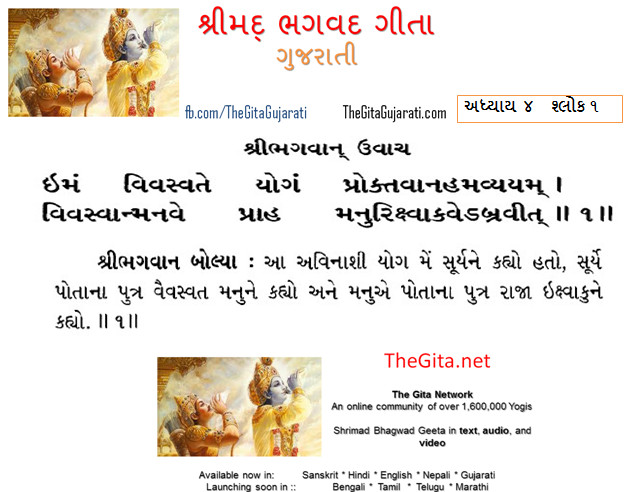
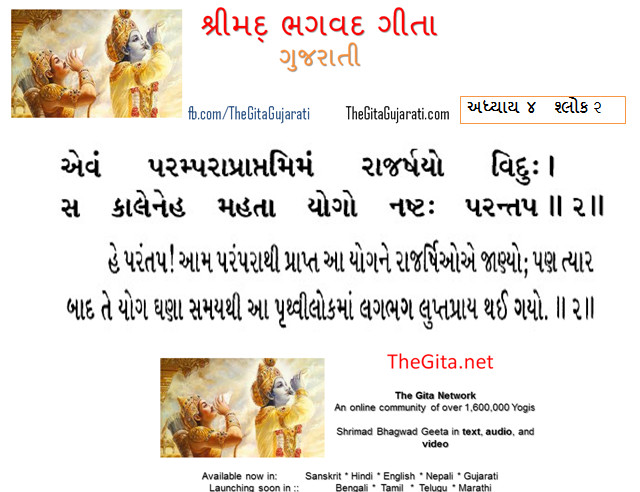
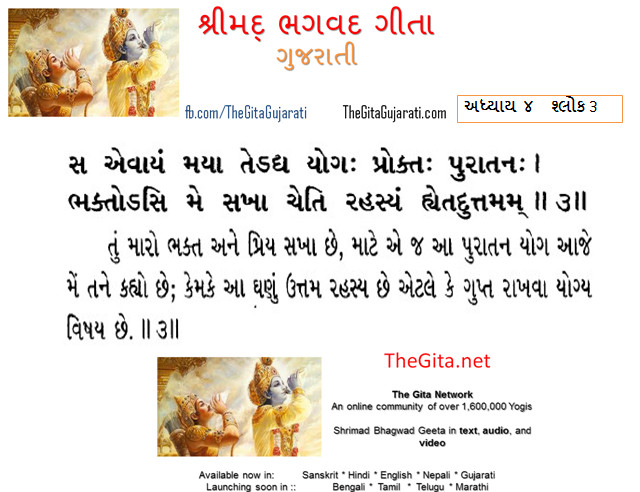
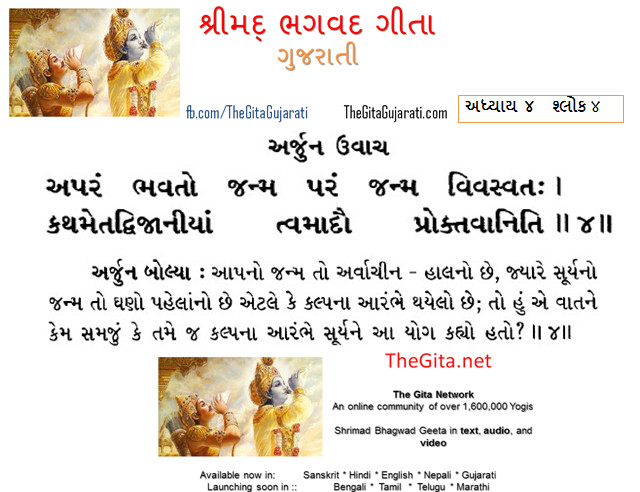
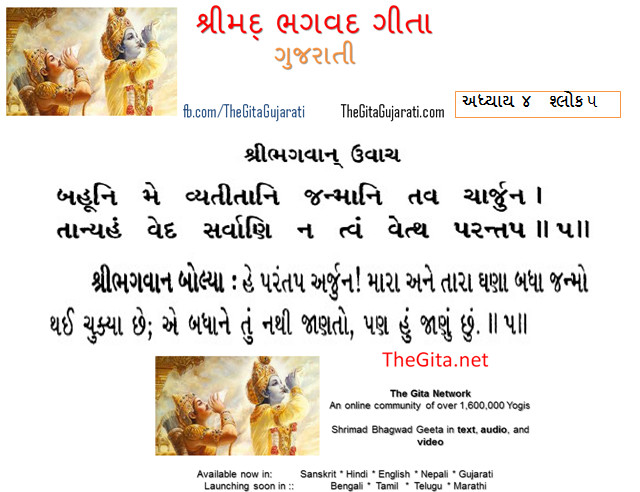
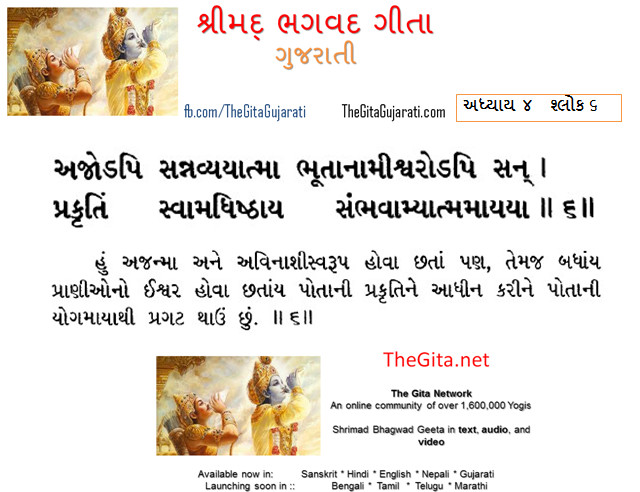
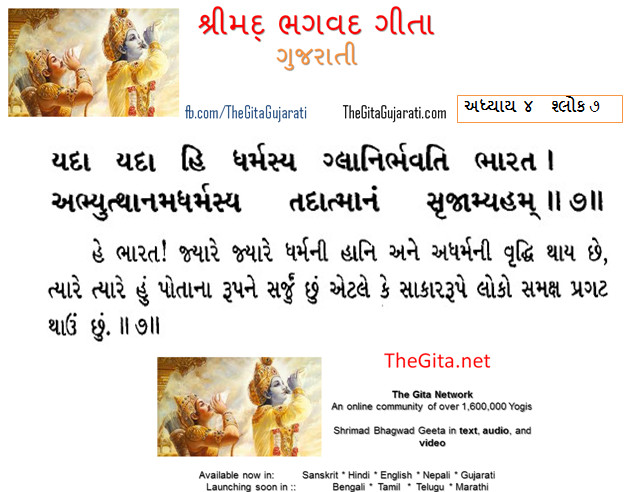
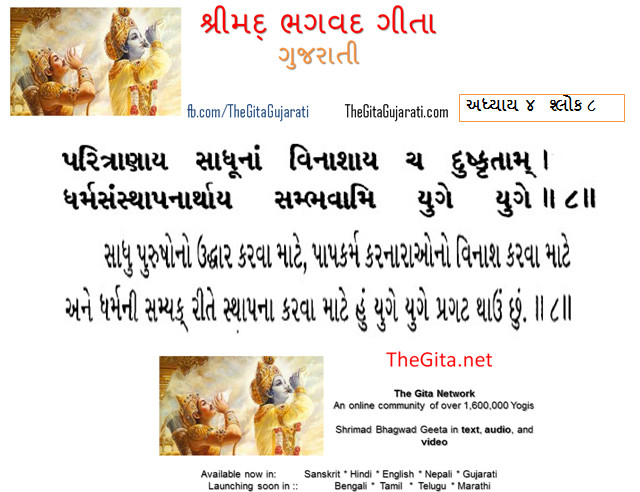
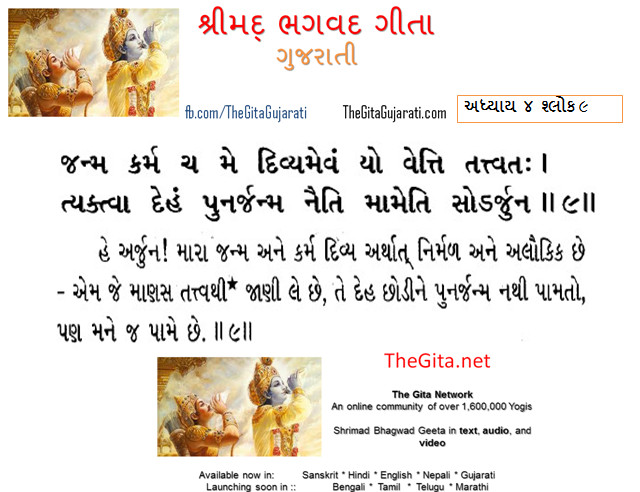
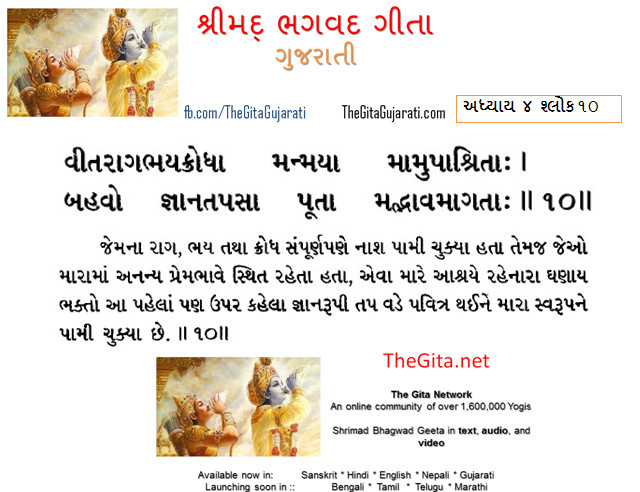
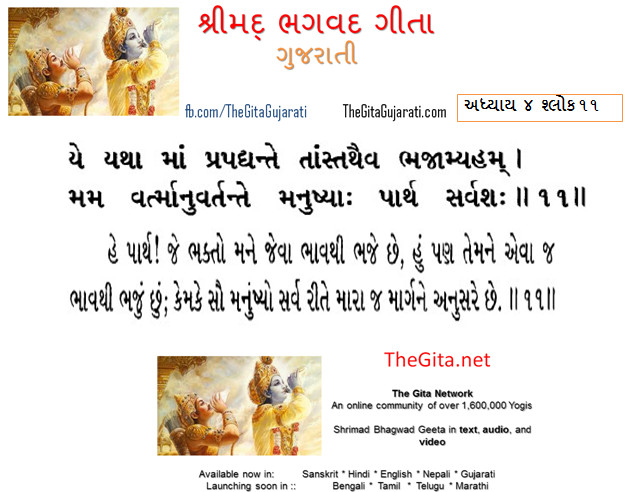
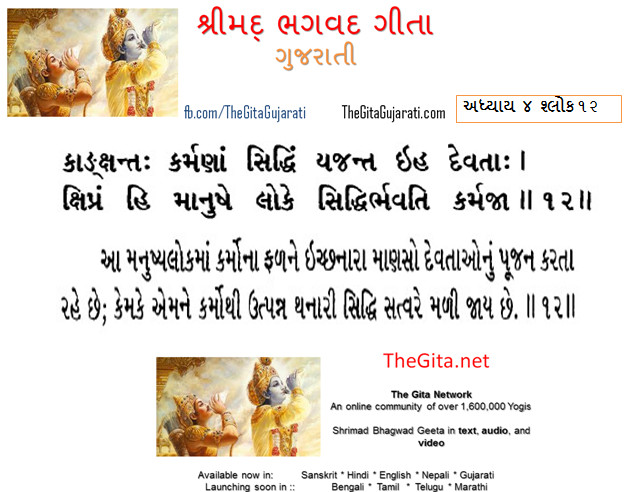
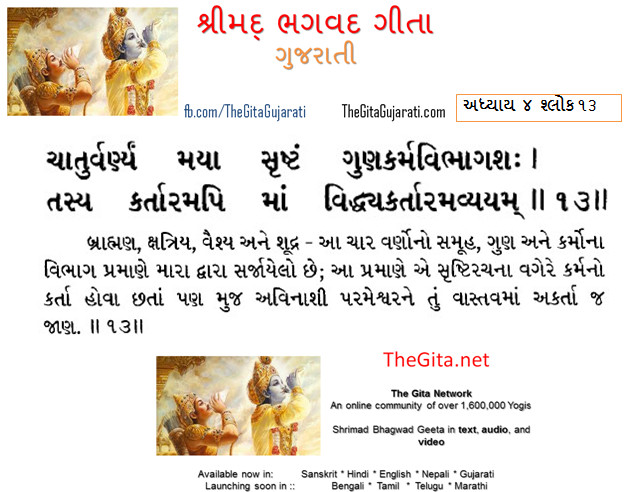
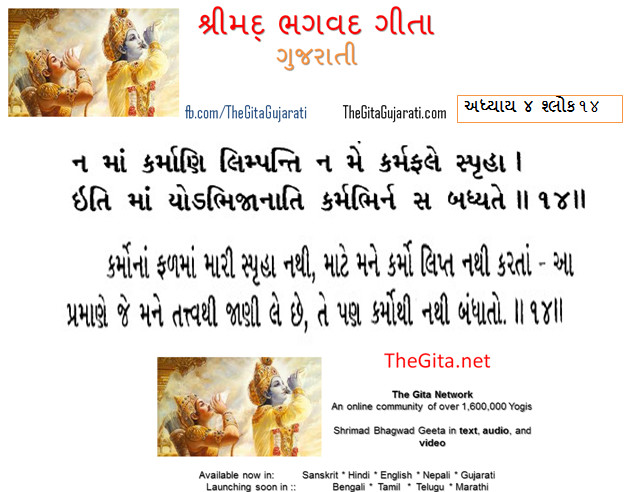
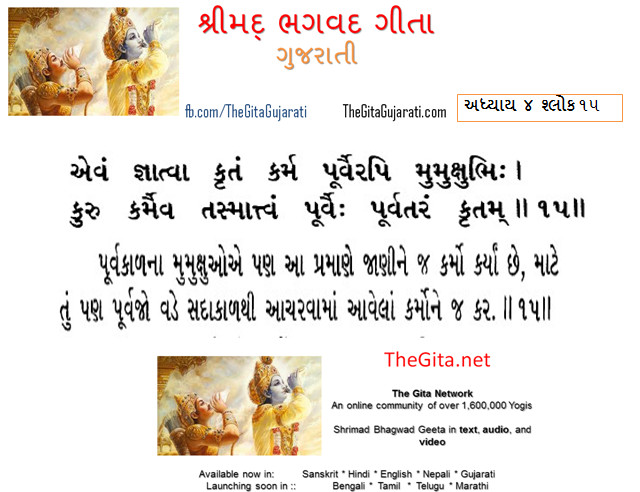
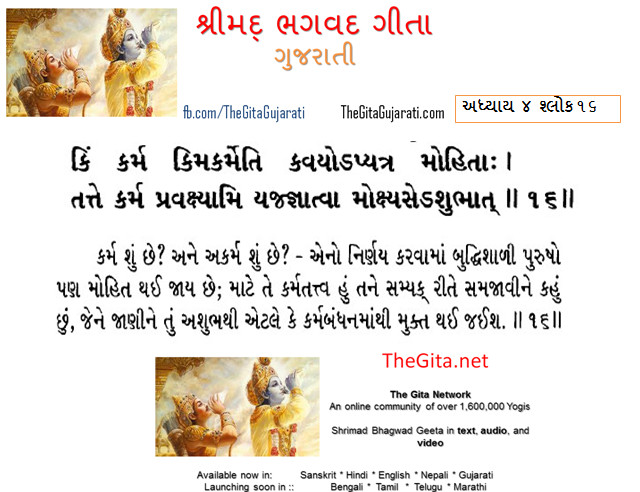

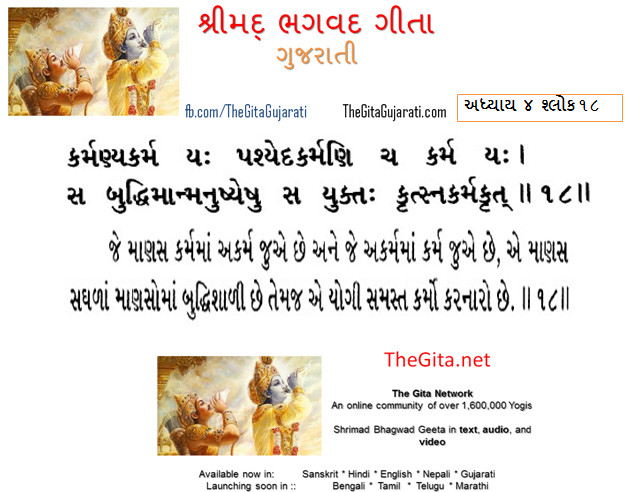
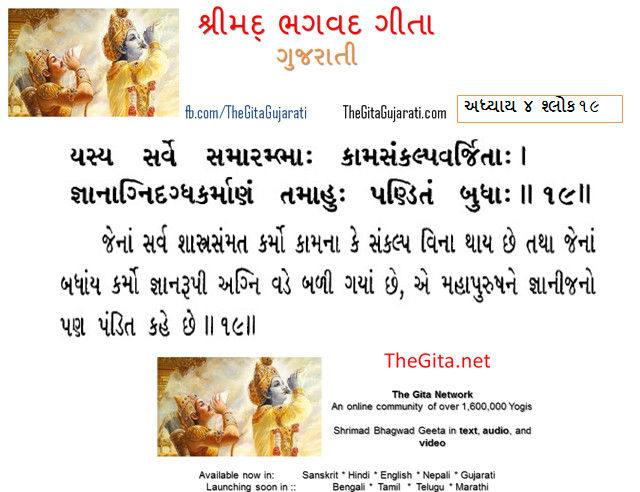
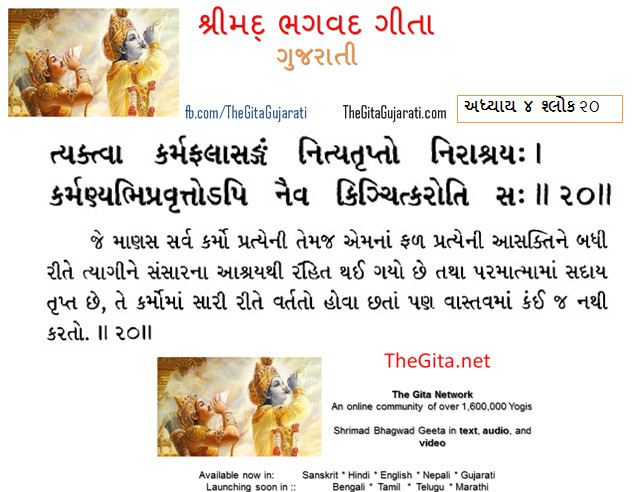
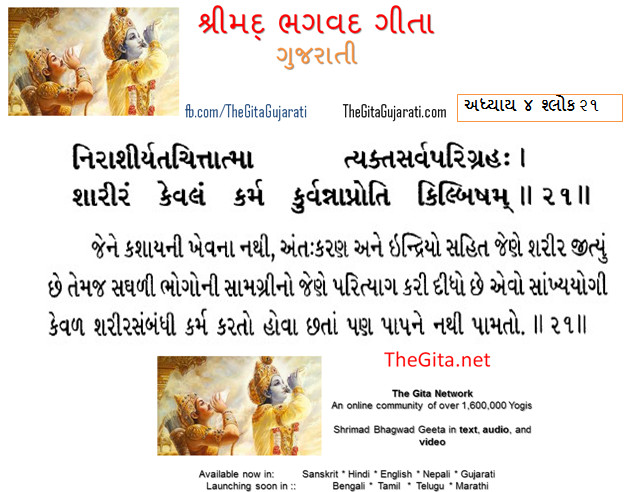
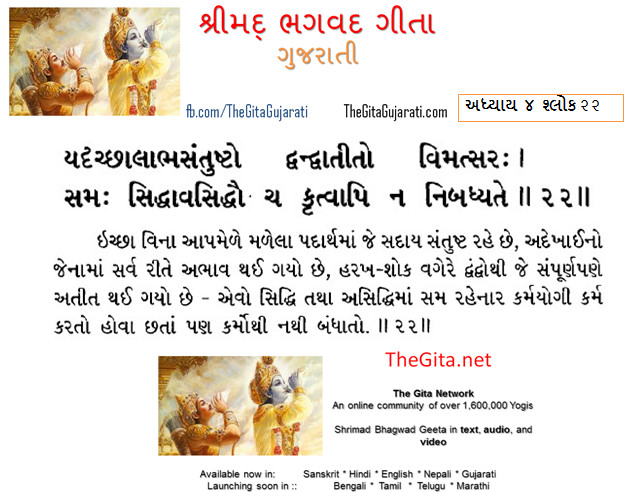
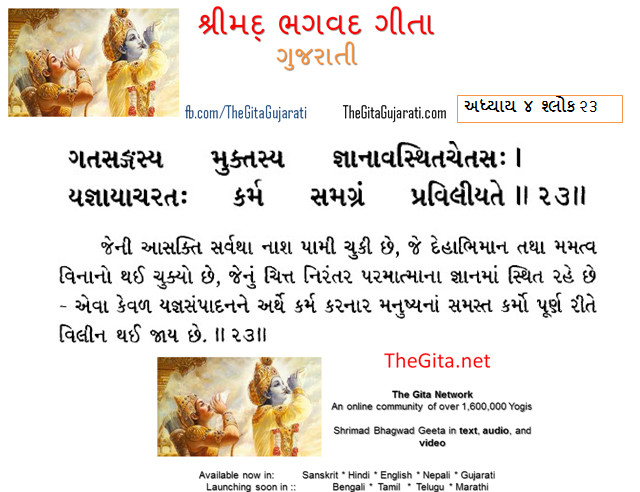
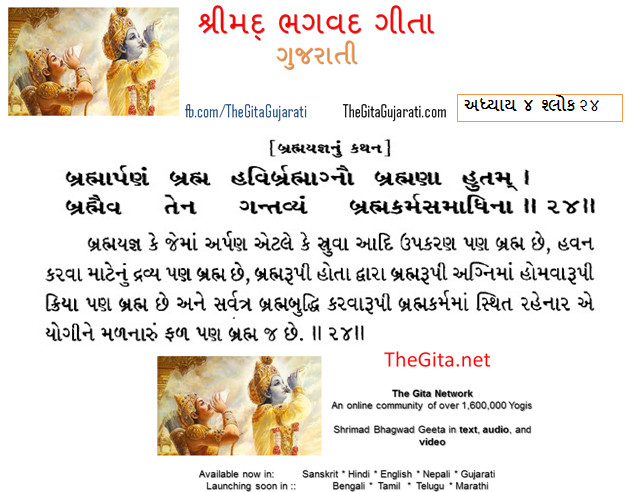

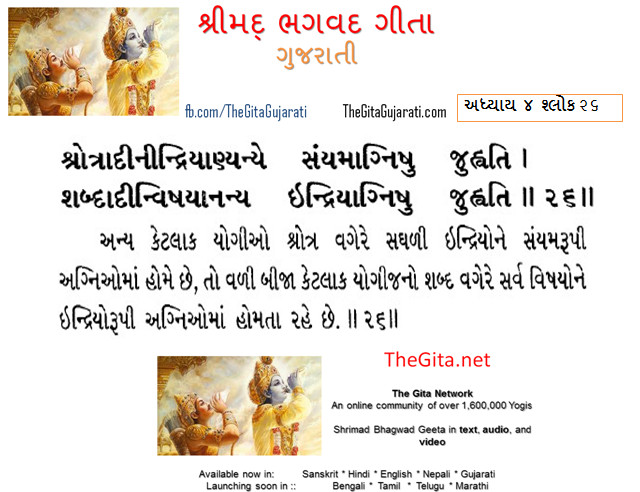
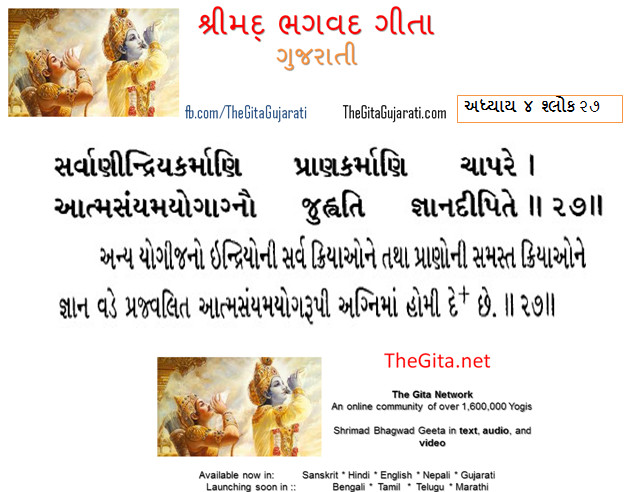
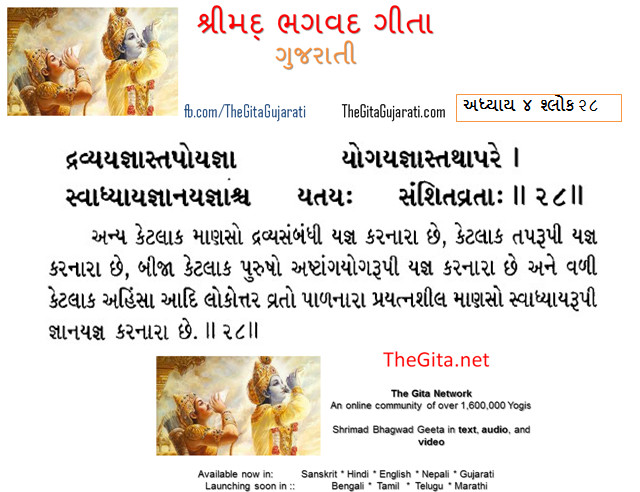
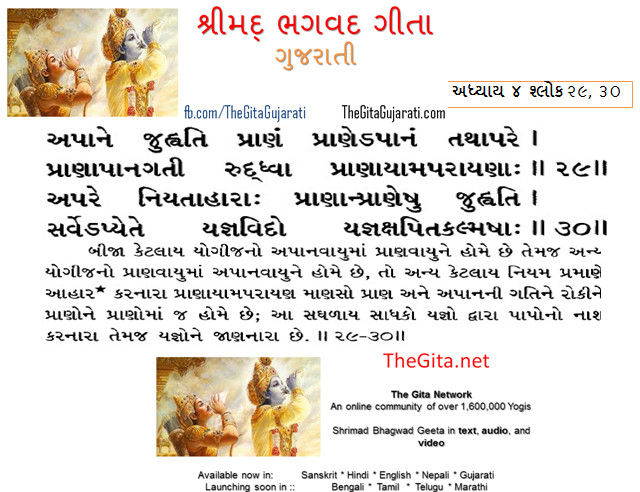


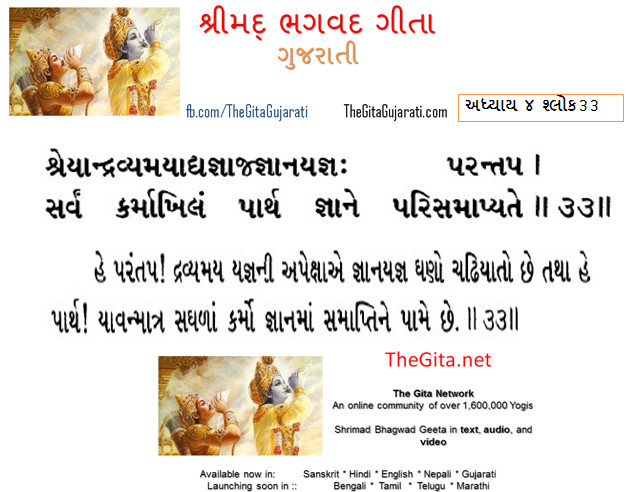
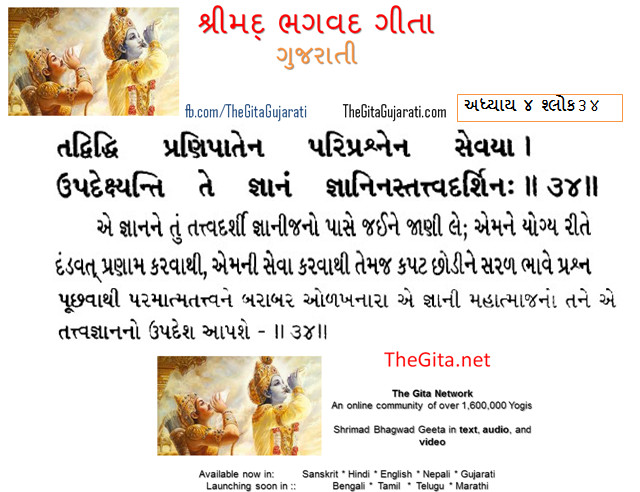
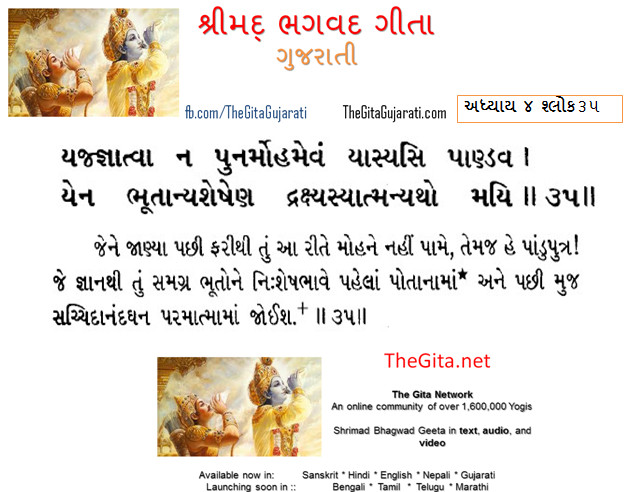
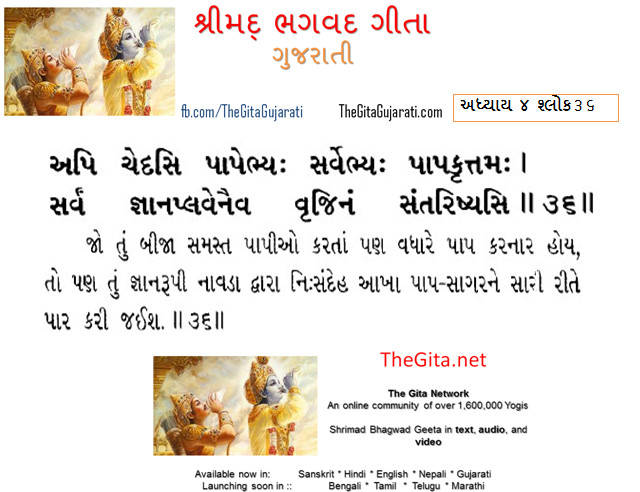
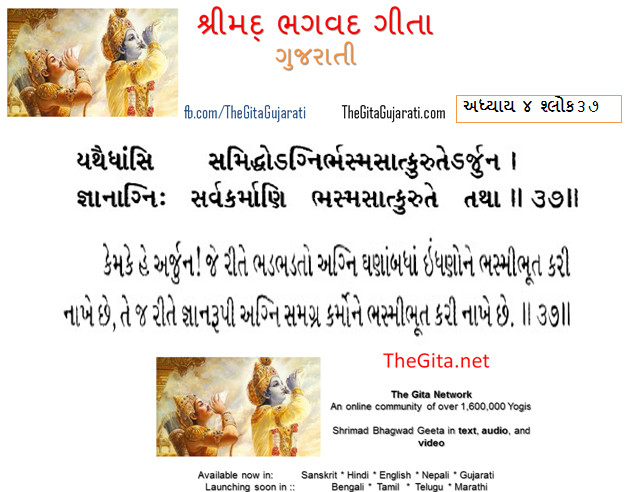
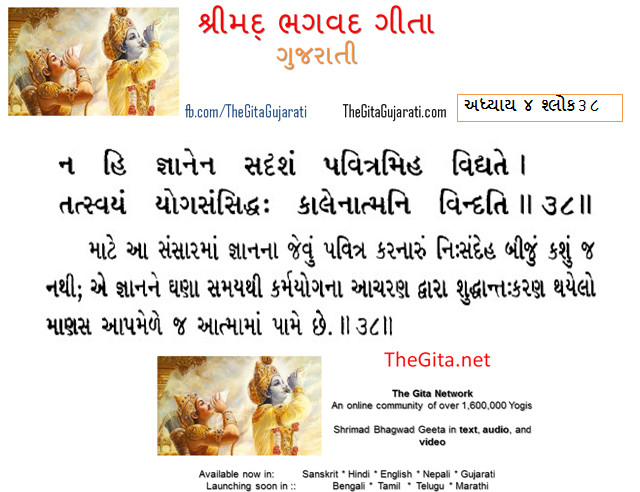
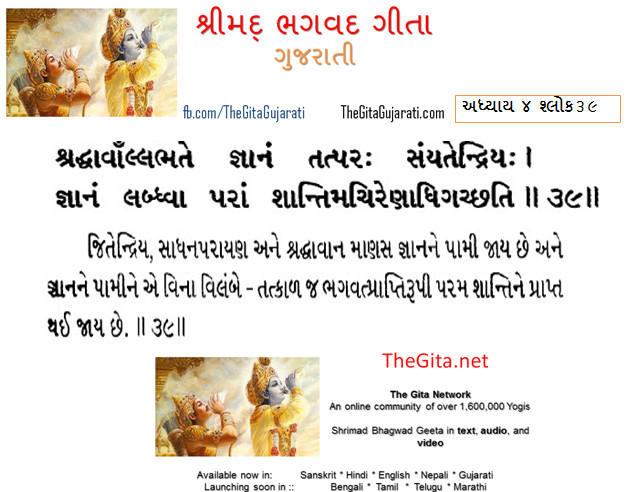
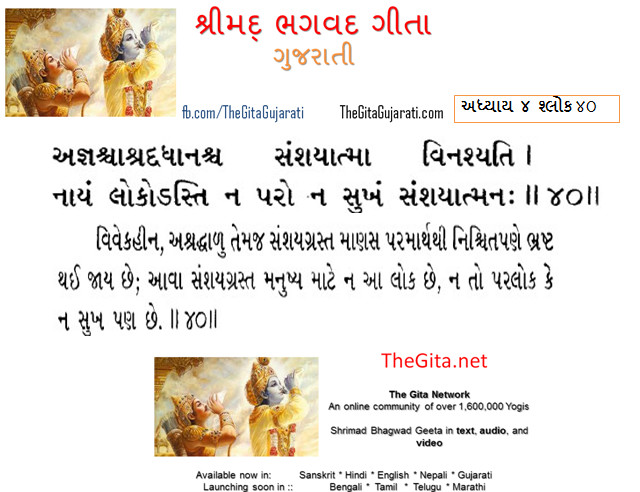
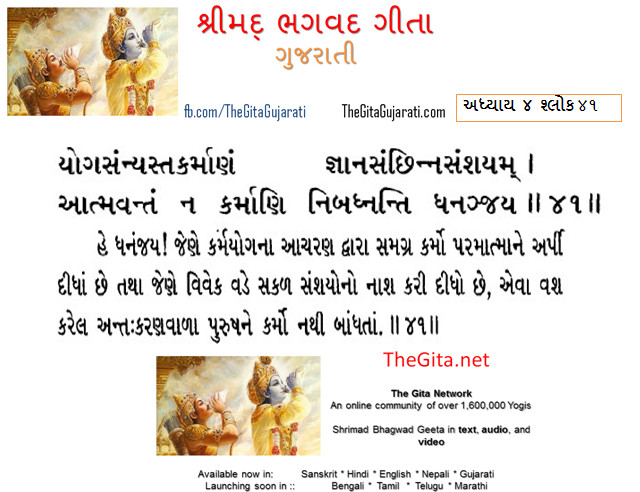

Pingback: અધ્યાય-૩-ગીતા ગુજરાતી | The Gita - Gujarati